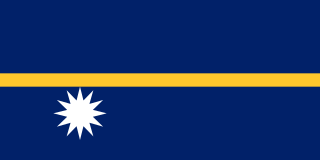
Nauru, officially the Republic of Nauru and formerly known as Pleasant Island, is an island country and microstate in Oceania, in the Central Pacific. Its nearest neighbour is Banaba of Kiribati, about 300 km (190 mi) to the east. It lies northwest of Tuvalu, 1,300 km (810 mi) northeast of Solomon Islands, east-northeast of Papua New Guinea, southeast of the Federated States of Micronesia and south of the Marshall Islands. With an area of only 21 km2 (8.1 sq mi), Nauru is the third-smallest country in the world behind Vatican City and Monaco, making it the smallest republic as well as the smallest island nation. Its population of about 10,000 is the world's second-smallest, after Vatican City.

The history of human activity in Nauru, an island country in the Pacific Ocean, began roughly 3,000 years ago when clans settled the island.

The politics of Nauru take place in a framework of a parliamentary representative democratic republic, whereby the President of Nauru is the head of government of the executive branch. Legislative power is vested in both the government and the parliament. The Judiciary is independent of the executive and the legislature.
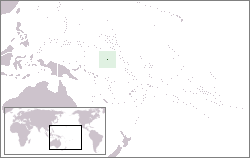
Reverend Philip Adam Delaporte was a German-born American Protestant missionary who ran a mission on Nauru with his wife from 1899 until 1915. During this time he translated numerous texts from German into Nauruan including the Bible and a hymnal. He was also one of the first to create a written form for the Nauruan dialect, published in a Nauruan-German dictionary.
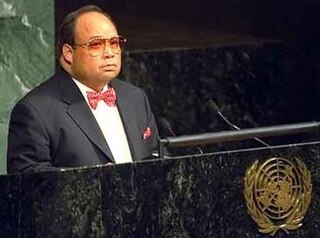
René Reynaldo Harris was President of the Republic of Nauru four times between 1999 and 2004. He was a Member of Parliament from 1977 to 2008.

Angam Day is a holiday recognised in the Republic of Nauru. It is celebrated yearly on October 26.

The displacement of the traditional culture of Nauru by contemporary western influences is evident on the island. Little remains from the old customs. The traditions of arts and crafts are nearly lost.

Timothy Detudamo was a Nauruan politician and linguist. He served as Head Chief of Nauru from 1930 until his death in 1953.
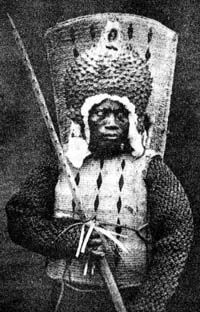
The Nauruan Civil War was fought from 1878 to 1888, between forces loyal to incumbent King Aweida of Nauru and those seeking to depose him in favour of a rival claimant. The war was preceded by the introduction of firearms to the island and its inhabitants, Nauruans, as a whole. For the majority of the war, the loyalists and the rebels found themselves in a stalemate, with one side controlling the northern and the other the southern part of the island.
European exploration and settlement of Oceania began in the 16th century, starting with the Spanish (Castilian) landings and shipwrecks in the Mariana Islands, east of the Philippines. This was followed by the Portuguese landing and settling temporarily in some of the Caroline Islands and Papua New Guinea. Several Spanish landings in the Caroline Islands and New Guinea came after. Subsequent rivalry between European colonial powers, trade opportunities and Christian missions drove further European exploration and eventual settlement. After the 17th century Dutch landings in New Zealand and Australia, with no settlement in these lands, the British became the dominant colonial power in the region, establishing settler colonies in what would become Australia and New Zealand, both of which now have majority European-descended populations. States including New Caledonia (Caldoche), Hawaii, French Polynesia and Norfolk Island also have considerable European populations. Europeans remain a primary ethnic group in much of Oceania, both numerically and economically.
The British Phosphate Commissioners (BPC) was a board of Australian, British, and New Zealand representatives who managed extraction of phosphate from Christmas Island, Nauru, and Banaba from 1920 until 1981.

Nauruan nationality law is regulated by the 1968 Constitution of Nauru, as amended; the Naoero Citizenship Act of 2017, and its revisions; custom; and international agreements entered into by the Nauruan government. These laws determine who is, or is eligible to be, a national of Nauru. The legal means to acquire nationality, formal membership in a nation, differ from the domestic relationship of rights and obligations between a national and the nation, known as citizenship. Nauruan nationality is typically obtained either on the principle of jus soli, i.e. by birth in the Nauru or under the rules of jus sanguinis, i.e. by birth to parents with Nauruan nationality. It can be granted to persons with an affiliation to the country who has lived in the country for a given period of time through naturalization.
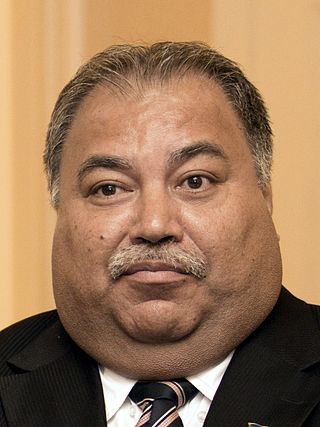
Baron Divavesi Waqa is a Nauruan politician who was the 14th President of Nauru from 11 June 2013 until 27 August 2019. He previously served as Minister of Education from 2004 to 2007.
Topics related to Nauru include:

The economy of Banaba and Nauru has been almost wholly dependent on phosphate, which has led to environmental disaster on these islands, with 80% of the islands’ surface having been strip-mined. The phosphate deposits were virtually exhausted by 2000, although some small-scale mining is still in progress on Nauru. Mining ended on Banaba in 1979.

The Catholic Church in Nauru is part of the worldwide Catholic Church, which, inspired by the life, death and teachings of Jesus Christ, and under the spiritual leadership of the Pope and Roman curia in the Vatican City is the largest Christian church in the world. Bishop Paul Mea was Bishop of Tarawa, Nauru and Funafuti, Kiribati.
Nauruan law, since Nauru's independence from Australia in 1968, is derived primarily from English and Australian common law, though it also integrates indigenous customary law to a limited extent. Nauruan common law is founded mainly on statute law enacted by the Parliament of Nauru, and on precedents set by judicial interpretations of statutes, customs and prior precedents.

The Japanese occupation of Nauru was the period of three years during which Nauru, a Pacific island under Australian administration, was occupied by the Japanese military as part of its operations in the Pacific War during World War II. With the onset of the war, the islands that flanked Japan's South Seas possessions became of vital concern to Japanese Imperial General Headquarters, and in particular to the Imperial Navy, which was tasked with protecting Japan's outlying Pacific territories.

Frederick Royden Chalmers, was an Australian farmer, soldier, businessman, and government administrator. His murder by Japanese soldiers on Nauru in 1943 was the focus of a war crimes trial following the Second World War.
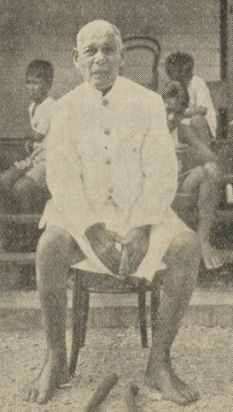
Daimon was Head Chief of Nauru from 1920 until 1930. His 42 years as a chief was a record length of service.














